Review for Cold Fish (2010)
Introduction
Third Window Films have in recent years single-handedly championed the cause of Eastern independent cinema, bringing some of the most stunning and inventive Japanese and Korean films to the UK, and highlighting the talents of some unique and quirky directors. Now it seems that the rest of the industry is catching on. Third Window may have released two of Sion Sono's films in the UK, Love Exposure and this, Cold Fish, but it will be Eureka Entertainment who will release Guilty of Romance later this year. Quite frankly, the more innovative world cinema that we get in the UK, the better. But I have to say that of the two Sion Sono films that I have seen, both have given me cause to hesitate before pressing play. With Love Exposure, it was the sheer length of the film, 4 hours, 2 discs worth that had me looking in my calendar weeks in advance to ensure that I had the time. With Cold Fish, it's the subject matter that gives me pause. It's something of a gory psychological horror, perhaps my least favourite genre of cinema. Then again, this is Sion Sono, so it's safe to say that this will be the least mainstream psychological horror that you can imagine. With Cold Fish, Third Window Films have something of a coup, as it will be released in the UK even before its native Japan, and we get it on sumptuous Blu-ray as well.
Shamoto thought he had a dysfunctional family. The quiet, undemonstrative man runs a tropical fish shop with his second wife Taeko, and his daughter Mitsuko. Mitsuko has never accepted Taeko as a replacement for her dead mother. Taeko refuses to respond whenever Shamoto has a rare moment alone with her, and the temperature in their household never gets above frosty. But then one day Mitsuko is caught shoplifting at a local supermarket. They meet a man named Murata who helps settle things, and seeing Mitsuko's rebellious tendencies, he even offers her a job at his shop, coincidentally another, larger tropical fish store, as a way of instilling a sense of responsibility. He's friendly, gregarious, and takes Shamoto and his family to his heart, as does his wife Aiko. But Murata's policy is to have his employees live at a dormitory near his shop. Then Murata invites Taeko to discuss her stepdaughter's future prospects as pretext to have sex with her. Then Murata offers Shamoto a chance to sit on a lucrative deal breeding fish, to get his help convincing a reluctant investor named Yoshida. Then when Yoshida signs on the dotted line, Murata and his wife poison him, and force Shamoto to help them dispose of the body. Now that's dysfunctional!
Picture
The 1.85:1 widescreen image is lush on this Blu-ray. It's crisp, vivid and detailed, which has to be balanced with the film's rather dark, naturalistic look. It's a realistic style, grainy and usually in natural lighting conditions that means that darker scenes will be less detailed than brighter ones, and that immediate visual pop that some may have come to expect from high definition images is replaced with something a little more subtle and atmospheric. Of course, given the number of HDTVs that are demoed with footage of the undersea world, it's fair to say that the various tropical fish in the film look amazing.
The images are sourced courtesy of Third Window Films, and may not necessarily represent the final Blu-ray release.
Sound
The sole audio track is a quite resplendent DTS-HD MA 5.1 Japanese track, and you also get optional English subtitles. The sound isn't immediately enveloping, rather it too is subtle and atmospheric. There are moments of stridency to be sure, but it is a dialogue heavy piece, realistic and understated, certainly not an action movie. It's only as the film reaches its climax do you realise how subtle the sound design is. There are moments of background noise, music, or effects, early on in the film that you may just dismiss as tonal moments that are related to that particular scene, and otherwise forgettable, but in fact turn out to presage what happens towards the end of the film. It's almost a subliminal effect, but brilliantly realised.
Extras
This is a two-disc set, with the film on the Blu-ray disc, while the extras are on disc 2, the same DVD that you'll find in the two-disc DVD release of the film.
The feature disc gets animated menus, with scene select and subtitle options.
On the DVD disc 2, you'll find some very useful extras.
In the Interview with co-writer Yoshiki Takahashi, filmmaker Norman England gets to sit down and have a very candid chat with the film's screenwriter, about the script writing process, working with Sion Sono the director, and his approach to the film, adapting it from a true story, trying to keep it as realistic as possible. This lasts 50 minutes.
Speaking of realism, The Interview With Jake Adelstein regarding the true story that inspired the film, takes a look at the Saitama Dog Lovers Serial Murders case that gets transposed into Cold Fish. Adelstein was a news reporter who followed the case, and has since devoted two chapters of his book Tokyo Vice to the story. He actually met the real life 'Murata' and is perfectly poised to compare fiction with reality. It's astounding how close the two are, up to a certain point. This lasts 40 minutes.
The Cold Fish Original Japanese Poster, It's Creation, Influences and Film Posters in General returns to the lounge of Yoshiki Takahashi, as it turns out that not only did he write the movie, but he also created the film's poster as well. This lasts 9 minutes.
You get the trailer for Cold Fish, and you also get 24 other trailers for Third Window products, including the forthcoming Akunin, and Sawako Decides.
Finally there are a couple of weblinks secreted away on the disc, directing you to Third Window Films, and their Youtube Channel.
Conclusion
I'm not a fan of horror, and the psychological thriller is a genre that usually leaves me cold. There are exceptions of course, and I do find it's the independent films; those that stray from establishment norms that tend to capture my interest. That said, it would have been a surprise if I had warmed to Cold Fish, and just as I expected having read the blurb, I never really got to enjoy it. It's a very well made film, smartly written, with great direction, and some excellent performances. I certainly had an intellectual fascination with how the story would unfold, the way that the characters would develop, and contrary to my usual experiences with the genre, Cold Fish threw up more than a few surprises, ventured in unexpected directions, and steered clear of the clichés. However, and no pun intended, there was something about Cold Fish that left me cold. It was a film that kept me at arms' length, and I never quite engaged with it on a visceral, emotional level. Again I think that was a deliberate choice by the filmmakers, steering clear of the comfortable and expected, constantly keeping the viewer uneasy and off balance. It's probably an approach that will work wonders with fans of the genre.
Cold Fish is a character study, with meek and unassuming Shamoto the focus of interest. He's almost a stereotypical modern Japanese man, gentle and un-aggressive to the point of subservience, a man whose primary ambition is to fit in with society, rather than make waves, and so it is that he's the head of a dysfunctional family, with a rebellious daughter and trapped in a loveless marriage. He's the perfect target for a gregarious sociopath like Murata, who can use Shamoto's weaknesses against him. It's his initial need to avoid the stigma of shoplifting applied to his daughter that compels him to grab the lifeline that Murata offers, and that's just the first step down a slippery slope. Cold Fish asks the question, at what point does a meek subservient man, snap and fight back? But more than that, it asks what happens next, which is where Cold Fish differs from most of the psychological horrors that I have seen.
It's also the answer to this second question that leaves me cold. I have to admit that I didn't really engage with the Murata character at all. That's despite learning afterwards that it was a remarkably uncanny portrayal, with the actor capturing the mannerisms and tone of the actual Saitama Dog Lovers mastermind. Murata is brash, outgoing, loud and overbearing. He's also a bully, obnoxious, and violent. What I didn't see in him was any charisma. It's easy to see why he dominated such a pushover as Shamoto, but there was none of that macabre fascination, no sign of the twisted relationship that forms between serial killer and victim in movies like The Hitcher and Wolf Creek. It's a one-way street of dominance between Murata and Shamoto, and none of the give and take, no battle of wits that would have made the relationship between the two more interesting. It's just a slow build up to the point that Shamoto finally snaps.
The thing about the average psychological horror is that it's that point where the protagonist snaps that the audience waits for. It's what they pay to see. It's the moment after an hour and more of torment and abuse, the point where the worm finally turns and bites his tormentor. You want that catharsis, that release of good triumphing over evil. And Cold Fish gives it to you… for about ten seconds. I was left with a sour taste in my mouth as it became clear just what turning the tables actually meant for Shamoto, and Cold Fish really becomes a bleak and nasty, relentless dredging of the worst of human nature. It's a downhill spiral all the way to the end credits, and I find that I could elicit nothing positive from watching the film. The only actual weakness that the film has, or one that I can objectively recognise as weak, is the way that it treats the policemen characters in the film, as they are presented as ineffectual and incompetent, really just convenient maguffins to move the story along, and who wouldn't be out of place in a Keystone Cops movie.
Other than that, Cold Fish is very well made, with outstanding direction, great writing, and great performances. The way the story unfolds is compelling, and there are some really quite delightful dark, macabre comic moments. It's also probably the goriest Japanese film I have seen since Kichiku: Banquet of the Beasts, although it's accomplished to much better effect. Fans of this particular genre would be daft to let Cold Fish slip through their fingers, especially as the Blu-ray is so appealing, and the extra features so well chosen and appropriate to the feature. It's just that I didn't like it.
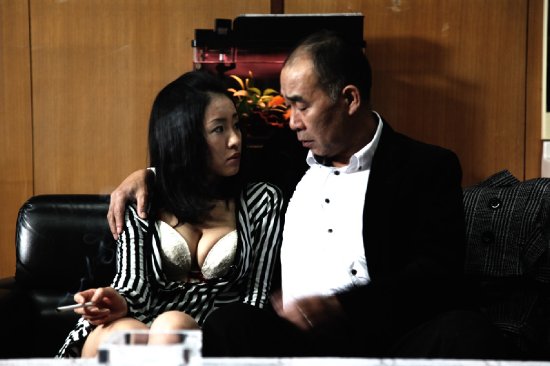
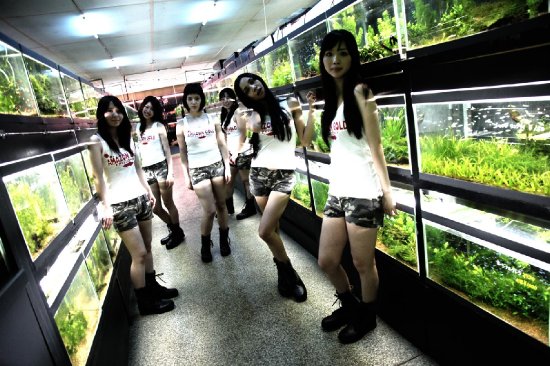
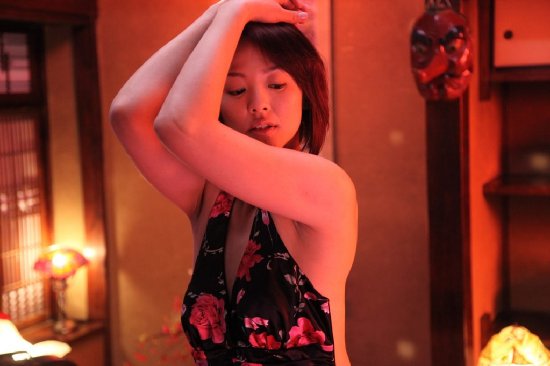
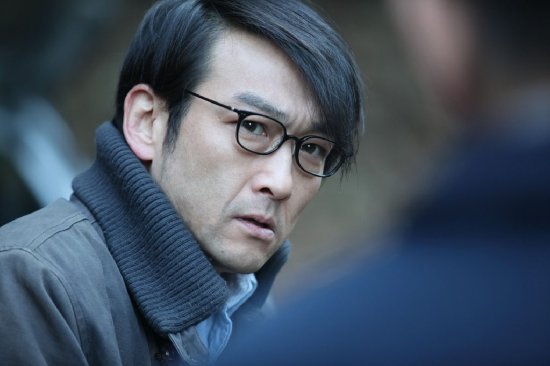
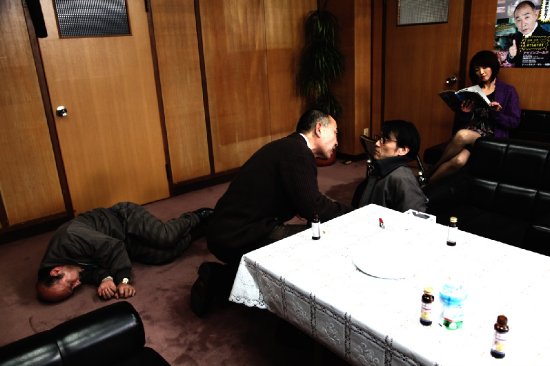
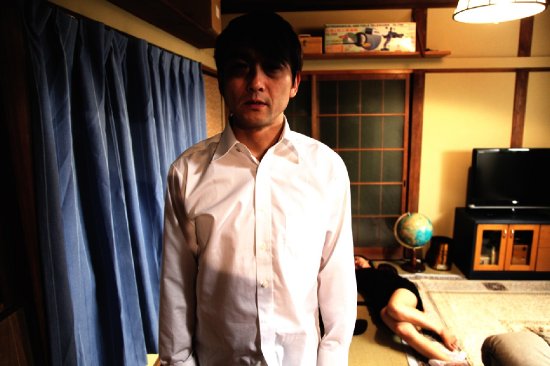
Your Opinions and Comments
Be the first to post a comment!